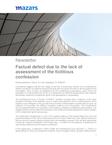
Factual defect due to the lack of assessment of the fictitious confession
It sometimes happens that the Civil Judge, at the time of sentencing, refrains from considering the fictitious confession as evidence because the party did not answer the claim or did not appear to the interrogation. Such conduct, as established by the constitutional jurisprudence, gives rise to the generation of a factual defect due to the non-assessment (or defective assessment) of the evidence that directly violates the fundamental rights of the participants in a proceeding.
The Constitutional Court, in Ruling T-513/2011, revoked, via tutela action, a decision of the Labor Cassation Chamber of the Supreme Court of Justice and ordered to annul a judicial decision of the Superior Court of Bogota on the grounds that such body of administration of justice did not value -as evidence in the process- the fictitious confession made by one of the parties. The Constitutional Court considered that the non-evaluation of the fictitious confession constituted a factual defect, in its negative sphere, due to a defective evaluation of the evidence and was equivalent to a direct violation of the fundamental right to due process.
The Corporation indicated that "in view of the evident existence of the factual defect, the Court will grant the protection of the right to due process of the firm Value Trade Corp. Ltda., taking into account that the second instance sentence issued within the liquidation process of the de facto partnership invoked by it against Qualification Technology Ltda. (...) suffers from the absence of assessment of documentary evidence and the fictitious confession".
In this regard also, in judgment T-1065 of 2006, the Constitutional Court said that "(...) There is a factual defect for failure to evaluate the evidence, when the judge omits to consider evidence that is in the file either because 'he does not notice them or simply does not take them into account for purposes of basing the respective decision, and in the specific case it is evident that if their analysis and evaluation had been carried out, the solution of the legal matter debated would vary substantially'. There is a factual defect due to defective assessment of the evidentiary material when either 'the judicial officer, against the evidentiary evidence, decides to completely separate himself from the duly proven facts and resolve the legal matter debated at his own discretion; (...). In short, this implies in two extreme events: to avoid overlooking the evaluation of certain evidence (an anomaly that is closely related to the absence of argumentative support for the judicial decision) or to derive non-existent or irrational effects from the tools legitimately collected in the process".
In judgment C-622 of 1998, the Constitutional Court indicated that although the fictitious confession was a legal presumption that as such admitted proof to the contrary, it had to be expressly disproved or else it would have to be considered as proof of confession in the process. Thus, in judgments C-622 of 1998 and T-589 of 2010 "the Court declared the existence of a factual defect because in the process the assessment was omitted and the fictitious confession was not disproved, that is, because no argumentation was presented tending to disprove the presumption that arose from it".
It is clear then that the Judge must evaluate the fictitious confession as one more piece of evidence in the process and, if this -as a presumption- is not rebutted in the process, he must give it the evidentiary weight of the confession.
Acting in the contrary way, damages not only the process itself, but also the fundamental rights of the parties to due process and the right to defense.


